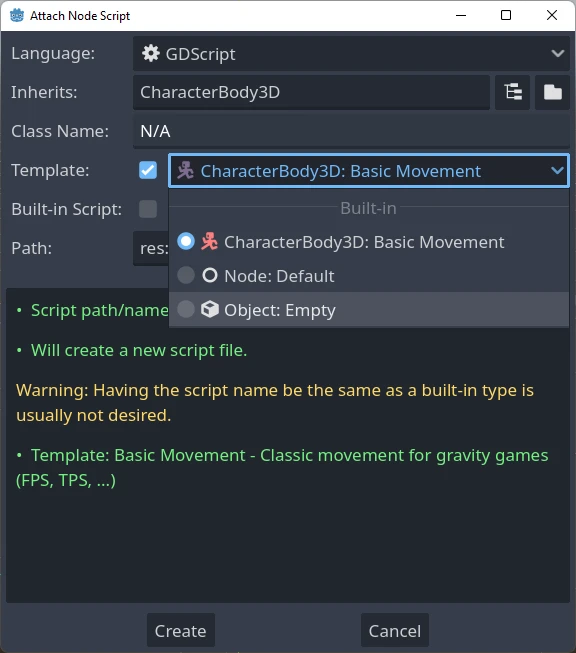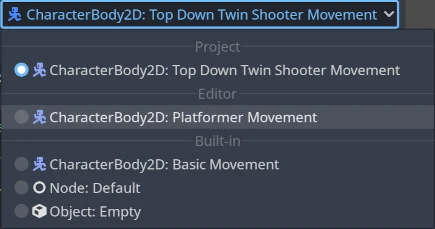Up to date
This page is up to date for Godot 4.2.
If you still find outdated information, please open an issue.
Création de modèles de script¶
Godot fournit un moyen d'utiliser des modèles de script comme on le voit dans le Script Create Dialog lors de la création d'un nouveau script :

A set of built-in script templates are provided with the editor, but it is also possible to create new ones and set them by default, both per project and at editor scope.
Templates are linked to a specific node type, so when you create a script you will only see the templates corresponding to that particular node, or one of its parent types. For example, if you are creating a script for a CharacterBody3D, you will only see templates defined for CharacterBody3Ds, Node3Ds or Nodes.
Localisation des modèles¶
Il existe deux endroits où les modèles peuvent être gérés.
Modèles définis par l'éditeur¶
Ils sont disponibles à travers tout les projets. L'emplacement de ces modèles est déterminé pour chaque OS :
Windows :
C:\Users\[username]\AppData\Roaming\Godot\script_templatesLinux :
$HOME/.config/godot/script_templates/macOS :
$HOME/Library/Application Support/Godot/script_templates/
Si aucun de ces modèles n'est trouvé, Godot recréera l'ensemble de modèles par défaut automatiquement, on peut utiliser ça pour réinitialiser l'état des modèles si vous les avez perdu par accident.
Modèles définis par le projet (templates)¶
Le chemin par défaut pour rechercher des modèles est le répertoire res://script_templates/. Le chemin peut être modifié en configurant le paramètre editor/script_templates_search_path dans le ProjectSettings, à la fois par code et par l'éditeur.
Si aucun répertoire script_templates n'est trouvé dans un projet, il est simplement ignoré.
Template organization and naming¶
Both editor and project defined templates are organized in the following way:
template_path/node_type/file.extension
where:
template_pathis one of the 2 locations discussed in the previous two sectionsnode_typeis the node it will apply to (for example, Node, or CharacterBody3D)fileis the custom name you can chose for the template (for example:platformer_movementorsmooth_camera)extension: will indicate which language the template will apply to (it should begdfor GDScript orcsfor C#)
Par exemple :
template_scripts/Node/smooth_camera.gdtemplate_scripts/CharacterBody3D/platformer_movement.gd
Default behaviour and overriding it¶
By default:
the template's name is the same as the file name (minus the extension, prettyfied)
the description is empty
the space indent is set to 4
the template will not be set as the default for the given node
It is possible to customize this behaviour by adding meta headers at the start of your file, like this:
# meta-name: Platformer movement
# meta-description: Predefined movement for classical platformers
# meta-default: true
# meta-space-indent: 4
// meta-name: Platformer movement
// meta-description: Predefined movement for classical platformers
// meta-default: true
// meta-space-indent: 4
In this case, the name will be set to "Platformer movement", with the given custom description, and it will be set as the default template for the node in which directory it has been saved.
This is an example of utilizing custom templates at editor and project level:

Note
Les modèles de script ont la même extension que les fichiers de script ordinaires. Cela peut conduire à un problème d'analyseur de script traitant ces modèles comme des scripts réels dans un projet. Pour éviter cela, assurez-vous d'ignorer le répertoire qui les contient en créant un fichier vide .gdignore. Le répertoire ne sera plus visible dans le système de fichiers du projet, mais les modèles pourront être modifiés par un éditeur de texte externe à tout moment.
Astuce
By default, every C# file inside the project directory is included in the compilation. Script templates must be manually excluded from the C# project to avoid build errors. See Exclude files from the build in the Microsoft documentation.
It is possible to create editor-level templates that have the same level as a project-specific templates, and also that have the same name as a built-in one, all will be shown on the new script dialog.
Modèle par défaut¶
To override the default template, create a custom template at editor or project level inside a
Node directory (or a more specific type, if only a subtype wants to be overridden) and start
the file with the meta-default: true header.
Only one template can be set as default at the same time for the same node type.
The Default templates for basic Nodes, for both GDScript and C#, are shown here so you can
use these as the base for creating other templates:
# meta-description: Base template for Node with default Godot cycle methods
extends _BASE_
# Called when the node enters the scene tree for the first time.
func _ready() -> void:
pass # Replace with function body.
# Called every frame. 'delta' is the elapsed time since the previous frame.
func _process(delta: float) -> void:
pass
// meta-description: Base template for Node with default Godot cycle methods
using _BINDINGS_NAMESPACE_;
using System;
public partial class _CLASS_ : _BASE_
{
// Called when the node enters the scene tree for the first time.
public override void _Ready()
{
}
// Called every frame. 'delta' is the elapsed time since the previous frame.
public override void _Process(double delta)
{
}
}
The Godot editor provides a set of useful built-in node-specific templates, such as
basic_movement for both CharacterBody2D and
CharacterBody3D and plugin for
EditorPlugin.
Liste des modèles d'espaces réservés¶
Voici la liste complète des modèles d'espaces réservés intégrés qui sont actuellement implémenté.
Espaces réservés de base¶
Substitut temporaire |
Description |
|---|---|
|
The name of the Godot namespace (used in C# only). |
|
Le nom de la nouvelle classe (uniquement utilisé en C#). |
|
Le type de base dont hérite un nouveau script. |
|
Indentation placeholder. The exact type and number
of whitespace characters used for indentation is
determined by the |
Type d'espaces réservés¶
There used to be, in Godot 3.x, placeholders for GDScript type hints that
would get replaced whenever a template was used to create a new script, such as:
%INT_TYPE%, %STRING_TYPE%, %FLOAT_TYPE% or %VOID_RETURN%.
The placeholders no longer work for Godot 4.x, but if the setting
text_editor/completion/add_type_hints from
EditorSettings is disabled, type hints
for parameters and return types will be automatically removed for a few
base types:
intStringArray[String]floatvoid:=will be transformed into=